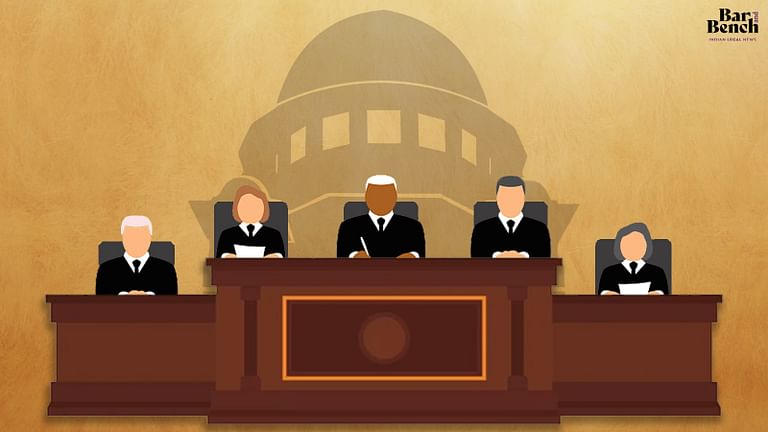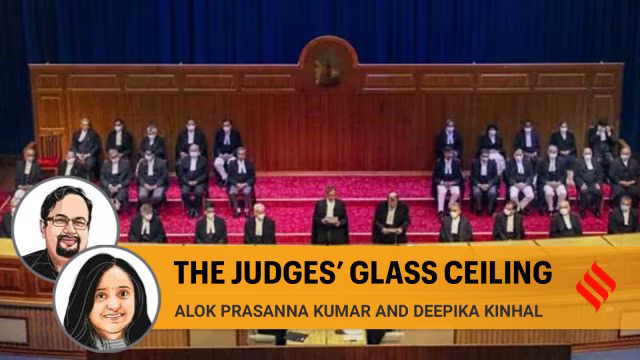
Substantial questions of law in cold storage? 35 Constitution Bench matters pending before Supreme Court
There are a total of 587 cases (main and connected matters) pending before Constitution Benches (benches with five or more judges) of the Supreme Court.
There are a total of 587 cases pending before Constitution Benches (benches with five or more judges) of the Supreme Court. Out of these, 35 cases are main matters, a decision in which will dispose of most of the connected matters as well.
According to Article 145(3) of the Constitution, cases that involve substantial questions of law as to the interpretation of the Constitution are required to be decided by a minimum of five judges. Once decided, these cases might overturn many laid down principles and precedents. The outcomes of these cases are likely to bring about socio-political impact, changes in policies, and in certain cases, affect lives and livelihoods.
For instance, the Jallikattu case will decide the legality of the traditional sport, while the Sabarimala case will determine whether women have a right to enter the Temple in exercise of their right to freedom of religion under Article 25 of the Constitution.
Despite the significance of the issues involved in these cases, most Constitution Bench matters find themselves buried in the docket for far too long. Further, while some of these cases have been written about extensively, others remain unknown to the general public.
Introduction to the Constitution Bench Pendency Project
To fill this gap in our knowledge, the JALDI (Justice, Access and Lowering Delays in India) initiative at the Vidhi Centre for Legal Policy has created summaries of all the cases pending before Constitution Benches of the Supreme Court. The cases are categorised according to the bench strength. These summaries are hosted on the JALDI Portal. At present, the portal reflects cases pending before 5-judge, 7-judge and 9-judge benches as on March 8, 2021.
Each summary contains the following elements:
- A timeline of events;
- The bench status and composition (if constituted);
- The case summary (containing the background, questions of law, laws under challenge, arguments made by the appellants and respondents, the court’s reasoning for referring the case to a Constitution Bench and the precedents under conflict in that particular case);
- Tagged matters showing the connected matters and how long a particular tagged matter has been pending for; and
- Further readings providing links to various other sources pertaining to that case.
The following sections discuss the important issues pending before the Constitution Benches, in order to make a case for their speedy disposal.
Cases pending before 5-Judge Benches
There are a total of 25 main and 267 connected matters pending before 5-judge benches of the Supreme Court. The following are some examples:
| Case | Issue |
| Anoop Baranwal v. Union of India, Ministry of Law and Justice Secretary | Seeking a more foolproof system for the appointment of members of the Election Commission. |
| Ashok Kumar Jain v. Union of India | A challenge to the Constitution (79th Amendment) Act, 1999 which extended the reservations of seats in the House of People and Legislative Assemblies of the States for Anglo Indians, Scheduled Castes and Scheduled Tribes communities. |
| Ashwini Kumar Upadhyay v. Union of India | Constitutional validity of practices of Nikah Halala, Nikah Mutah, Nikah Misyar and polygamy along with the Dissolution of the Muslim Marriages Act, 1939. |
| Assam Public Works v. Union of India | The exercise for preparation and updating of the National Register of Citizens (NRC) for the state of Assam. |
| Janhit Abhiyan v. Union of India | Constitutionality of the Constitution (One Hundred and Third Amendment) Act, 2019 that provided for reservations for economically weaker sections. |
| Karmanya Singh Sareen v. Union of India | WhatsApp’s privacy policy and its users’ right to privacy under Article 21. |
| Shilpa Sailesh v. Varun Sreenivasan | Supreme Court’s power under Article 142 to dissolve a marriage between consenting parties. |
| Sita Soren v. Union of India | Whether the immunity conferred on members of the Legislative Assembly (under Article 194(2)) in respect of any vote given by them in the Legislature includes immunity against prosecution for bribery. |
| State of Andhra Pradesh v. B. Archana Reddy | Constitutional validity of a state legislation declaring all members of the Muslim community in Andhra Pradesh as part of the “Backward Classes”. |
| State of Punjab v. Sahil Mittal | Granting of minority status to Sikhs in the state of Punjab. |
| Vivek Narayan Sharma v. Union of India | Decision of the Indian government to demonetise notes of Rs. 500 and Rs. 1000 through a Notification dated 08-11-2016. |
Cases pending before 7-Judge Benches
There are 5 main and 57 connected matters pending before 7-judge benches. Some examples of the pending cases can be found below:
| Case | Issue |
| Aligarh Muslim University v. Naresh Agarwal | Aligarh Muslim University’s status as a “minority educational institution”. |
| N. Ravi v. Speaker, Legislative Assembly, Chennai | Whether privileges and immunities of the House of the Legislatures available under Article 194 of the Constitution can override freedom of press provided under Article 19(1)(a). |
| The State of Punjab v. Davinder Singh | Sub-classification within the seats reserved for Scheduled Castes in the state of Punjab. |
Cases pending before 9 Judge Benches
There are 5 main and 228 connected matters pending before 9-judge benches. Some of the key pending cases are:
| Case | Issue |
| Mineral Area Development Authority etc. v. M/S Steel Authority of India | Whether the term “royalty” mentioned under the Mines and Minerals (Development and Regulation) Act, 1957 is a “tax”. |
| State of Uttar Pradesh v. Jai Bir Singh | Scope of the definition of the term ‘‘Industry’’ under Section 2(j) of the Industrial Disputes Act, 1947. |
Need for bringing Constitution Bench cases out of cold-storage
As the above examples show, there are crucial issues with wide-ranging consequences that are pending before Constitution Benches. What is concerning, however. is how some of these cases have been pending for decades. The delay in deciding them has rendered the issue involved infructuous.
For instance, in Central Board of Dawoodi Bohra Community v. State of Maharashtra, the key issue was the constitutionality of the Bombay Prevention of Ex-communication Act, 1949. During the course of the proceedings before the Supreme Court, the Act was repealed by the State legislature. The case, however, still remains pending on the Supreme Court’s docket.
Similarly, the petitions challenging demonetisation have become a mere academic exercise now, since the decision in question has become a fait accompli. The Constitution Bench Pendency Project is an attempt to bring to light more such examples and other issues in the functioning of these benches and initiate more in-depth research on this subject
This article is the first of the four part series on Constitution Bench pendency. It was originally published in Bar and Bench.
Views are personal.


